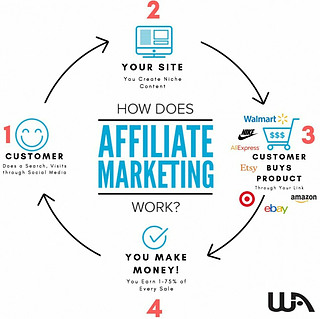One way to earn money online is through affiliate marketing. For someone who’s just starting out trying to make money online, affiliate marketing may sound complicated or even too much work. For some people, this can be true. If you’re willing to step out of your comfort zone just a little though, it can be an incredible opportunity.
Affiliate marketing isn’t for everyone. It takes consistent effort, and it’s not as easy as answering a few questions and earning points through surveys. In simple terms, affiliate marketing consists of leading people to a particular product or service that they are in need of, and receiving a commission when they purchase that product or service.
There are different ways to accomplish this and hopefully this article will give you a basic foundation of the how-to of affiliate marketing.
What Is Affiliate Marketing
Affiliate marketing is a performance-based marketing strategy where a business rewards one or more affiliates for each visitor or customer brought by the affiliate’s marketing efforts. In simpler terms, it’s a way for individuals affiliates to earn a commission by promoting other people’s products or services.

The How-To of Affiliate Marketing
To lay your foundation for affiliate marketing, you must first have a marketing channel where you can promote a particular product or service. There are various channels that you can use. The best channel to use should be based on the product or service you are trying to sell, as well as what type of marketing you are comfortable with.
Various types of channels to use could be a website that you own, a blog, social media, email marketing, or other online platforms, such a Quora or YouTube, which are just two examples.
Once you decide the type of online channel that you will market from, you need to apply to an affiliate program compatible with what your website or other channel is promoting. Example: If you have a blog about pets, look for an affiliate program that sells pet products. Many companies, especially online retailers, have affiliate programs. There are literally thousands of various programs that you can join. A simple online search will lead you in the right direction.
You will be required to apply to all affiliate programs that you are interested in, and not everyone will be accepted to every program. Your best chance to be accepted into a program is to have an established channel with a consistent user base.
If you already have a blog or YouTube channel, you can find a relatable product to advertise on that channel. If you’re just getting started, you will need to first create a channel to use. For all-in-one web hosting, training and support, check out Wealthy Affiliate. 
Once you are accepted into an affiliate program, you will receive unique affiliate links that will track the traffic and sales that you generate. When people click on your affiliate links and make a purchase or complete a desired action, such as signing up for a trial, you earn a commission. Commission structures vary by product and company, but it’s normally either a percentage of the sale, or a fixed amount per product.
Just like any money-making opportunity, affiliate marketing has both its benefits as well as well as its challenges.
Benefits of Affiliate Marketing
There are several benefits to affiliate marketing. Following are just a few perks:
1. Passive Income: Once you have your channel established and set up your affiliate links, you can potentially earn money passively as long as people continue to click on your links and make purchases.
2. Low Initial Investment: Getting started with affiliate marketing usually requires minimal upfront costs. You don’t have to create a product or handle inventory. You will need an upfront investment for website hosting and domain name when creating a website, but with affiliate marketing you don’t have any inventory cost.
3. Diverse Product Range: You can choose from a wide range of products and services to promote, allowing you to create a channel that you are passionate about.
4. Flexibility: Affiliate marketing provides flexibility in terms of when and where you work. You can manage your campaigns and promotions on your schedule. You’re also not tied down to one particular location as you can manage your websites from most anywhere in the world. 
Challenges of Affiliate Marketing
While affiliate marketing can be a lucrative venture, it’s not without its challenges. Here are some common pitfalls associated with affiliate marketing:
1. Unreliable Income: Affiliate marketing income can be inconsistent, especially when starting. Sales may fluctuate, and factors like seasonality or changes in consumer behavior can impact earnings.
2. Dependence on Affiliate Programs: Your success is tied to the policies and practices of the affiliate programs you join. If a program changes its commission structure or terms of service, it can affect your income. This is a common practice of some programs, so make sure you do your research.
3. Product Quality and Reputation: If you promote low-quality or scammy products, it can damage your reputation with your audience. Always choose products or services that align with your values and provide value to your audience.
4. Cookie Duration and Tracking Issues: Affiliate sales are often tracked through cookies, and if a potential customer clears their cookies or uses a different device, you might not receive credit for the sale. Additionally, some affiliate programs have short cookie durations, limiting the time window for earning commissions.
5. Payment Delays and Thresholds: Some affiliate programs have payment thresholds that you must reach before receiving payouts. Additionally, payment delays or issues can occur, affecting your cash flow.
6. Legal and Compliance Risks: Adhering to regulations and guidelines is crucial in affiliate marketing. Failure to disclose affiliate relationships, engaging in deceptive practices, or violating terms of service can lead to legal consequences and damage your online reputation.
7. Algorithm Changes: Search engines and social media platforms frequently update their algorithms. If your traffic relies heavily on these platforms, changes in algorithms can significantly impact your visibility and, consequently, your earnings.
8. Website Hacking: No matter how much security you have, by having your business online you subject yourself to online hackers. I know of a very successful affiliate marketer whos’ websites were hacked, taking all of his income away from him. This doesn’t happen often, but it is a possibility to be aware of.
To navigate these pitfalls, it’s essential to choose reputable affiliate programs, focus on building trust with your audience, diversify your income sources, and stay informed about industry trends and changes. With more sophisticated and knowledgeable hackers, you will also want to make sure you have the best security possible for your websites.
It is important to note that success in affiliate marketing does require time, effort, and strategic planning. Building a loyal audience, creating high-quality content, and choosing the right products or services to promote are crucial elements for success. Additionally, being transparent and trustworthy with your audience builds credibility, which is essential in affiliate marketing. Always comply with regulations and guidelines, and be sure to disclose your affiliate relationships to your audience.

These tips, along with consistently providing valuable content and sticking with a plan, will garner your long-term success in affiliate marketing.

